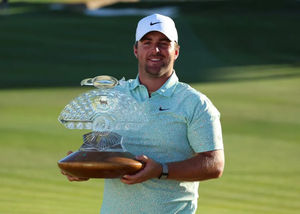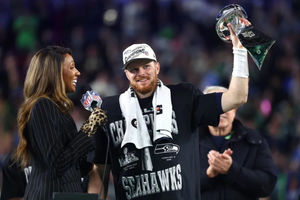Dick Enberg Was Always The Right Man For The Moment
 Denis Poroy/ [object Object]
Denis Poroy/ [object Object] Dick Enberg hummed his way through his most famous call.
It was Jan. 9, 1970, and Enberg was working alone as the UCLA basketball play-by-play man for a game against Oregon. The Bruins were ahead, as they always were in those days, but on this day they were frustrated by the Ducks’ zone. So John Wooden had them hold the ball and stall, a tactic that was within the rules in the era before the shot clock. But it was also a tactic that created an obvious problem for a broadcaster with lots of dead air to fill.
Enberg did what he could. He ran through the box score. He read over the remaining schedule. He even stared at the ceiling, where the sight of the Bruins’ championship banners inspired him to wing it with a history lesson. Still, after all that, there was no basketball action to describe.
“With nothing else to say,” Enberg wrote in his 2004 autobiography, “I decided to be honest with the audience.”
And so he spent several minutes humming the melody to “Raindrops Keep Falling On My Head,” that syrupy Burt Bacharach number that was all the rage thanks to the film Butch Cassidy and the Sundance Kid. The moment is lost to posterity, but the tune became a kind of anthem for the Bruins that season; Enberg would later fulfill a promise he made on the air to sing the song at center court if the Bruins won the Pac-8 title. But the following year, he refused numerous suggestions to conjure up a repeat performance.
“If I tried to do something this time,” Enberg wrote, “it would be contrived.”
Enberg just retired at age 81, concluding a career that began more than 60 years ago with a semipro baseball game in Mount Pleasant, Mich., and ended with his last game as the voice of the San Diego Padres on Oct. 2. He had announced his intentions last year, but unlike for Vin Scully—another Southern California broadcasting legend—there was little fanfare. Scully spent the entire season as a sitting national monument. But except for a few appreciative write-ups, mainly in the San Diego and Los Angeles markets, plus a podcast appearance with Sports Illustrated, Enberg’s final go-round barely made a ripple. Perhaps that’s because Enberg only spent the last seven seasons calling Padres games, and hadn’t done national work since 2011. But it also has a lot to do with the way Enberg approached his craft. He was always at his best when no one noticed he was there.
Enberg was fond of telling stories, but he never let his telling of those stories—or his enthusiasm during moments of high drama—overshadow the performance he was narrating. He took some criticism in San Diego for his determination to bring old-timey objectivity to his Padres broadcasts, and while he initially treated such appraisals as compliments, he eventually tweaked his approach without becoming a full-on homer.
“People didn’t tune in because I was doing the game,” Enberg once said. “They could tune out if they didn’t like the way I was doing the game.”
Other great baseball voices—Scully, Jack Buck, Harry Kalas—called other sports too. But Enberg called just about everything. His resume is staggering. Indiana University football and basketball. UCLA hoops, for whom Enberg called eight national championships in nine seasons. The L.A. Rams. The California Angels. National college basketball. National MLB. The NBA. The Rose Bowl. The World Series. The Super Bowl. The Breeders’ Cup. The Summer Olympics. Notre Dame football. The Masters, the PGA Championship, golf’s U.S. Open. All four of tennis’s Grand Slams. Enberg worked for NBC, CBS, and ESPN. He even had a run hosting game shows back in the day.
“I used to love the stories about the Sports Challenge shows,” Hall of Fame quarterback Dan Fouts told me over the phone.
Fouts, who played in many games Enberg called and later worked with him as an analyst for CBS, said Enberg’s versatility may be why his retirement didn’t resonate the same way Scully’s did.
“Maybe that worked against him in this case, because he’s known for so many things,” Fouts said.
I remember Enberg best for his work as NBC’s lead NFL play-by-play voice during my formative years. NBC had the rights to the AFC in those days, and just as much as Pat Summerall and John Madden came to represent prestige for CBS and Fox, if Enberg and Merlin Olsen were on the call, it was a big game. Usually, Enberg and Olsen were doing the late-afternoon national telecast, and usually they were following the AFC’s best teams, which for much of the 1980s meant the Chargers, Raiders, Broncos, Dolphins, Browns.
Enberg told his life story a few years ago in a pair of lengthy on-camera interviews with the Archive of American Television. Born and raised mostly in Michigan, he first dabbled in radio as an undergraduate at Central Michigan University, where he applied for a job as a janitor at a local station. The station manager liked his voice and put him on the air. He did Indiana football and hoops as he earned his master’s and his PhD, thinking he was going to live his life teaching and coaching. But after he couldn’t get a full-time teaching gig at IU—the dean of students told him he looked “like a shaved prostitute,” but you be the judge—Enberg decamped for a teaching and coaching gig at what is now Cal State Northridge. He supplemented his income by doing radio on the side in the San Fernando Valley. He auditioned around. He finally landed a job as sportscaster at an L.A. television station owned by Gene Autry, then the owner of the Angels, though he would later learn he was being paid 10 percent less than the union minimum. But Enberg was on his way.
Enberg’s voice has that air of Midwestern Nice to it, and it often sounds like he’s smiling as he speaks. His signature catch phrase—“Oh my!”—was an expression of his mother’s. Like Scully, Enberg was raised in the era when radio—with its emphasis on storytelling—was the dominant medium, and so, like Scully, he understood how to spin a yarn, to personalize the experience. But with television, the visuals do the heavy lifting, and so Enberg’s approach was to complement that, mostly by getting out of the way. If Scully was everyone’s gracious old grandfather, Enberg was that friend who sat next to you on the couch, sharing your enthusiasm and your surprise.
“Television, in any sport, we’re just docents,” Enberg told the Los Angeles Times last month. “We just guide the audience through the experience, and hopefully we can point out the hues and notes and make it a more interesting experience.”
For all the big games Enberg did—and I’m sticking to his ’80s-era NFL broadcasts here, since that’s what sticks with me—it’s striking that there are no instantly famous calls in any of them, no “Do you believe in Miracles,” no “See you tomorrow night.” But whenever there was a crescendo in the action, a game-changing play that made you gasp with excitement, there was Enberg, his voice rising to meet the moment.
Take A.J. Duhe’s pick six—his third interception of the game—to seal the 1982 AFC Championship Game:
Or Ken O’Brien’s touchdown pass to Wesley Walker to give the Jets a 51-45 overtime win over the Dolphins in ’86, a game every bit as bonkers as that score indicated:
Or The Fumble, by Earnest Byner, in the 1987 AFC Championship Game (5:10 mark):
Even in a blowout, Enberg had just the right touch. As the Raiders were destroying the Seahawks in the second half of the 1983 AFC title game, running back Marcus Allen had reached 100 yards rushing but hadn’t yet found the end zone. Enberg figured it was about to happen, and so he mostly just allowed it to happen (11:57 mark):
“If on my gravestone it said, ‘Never called for interference,’” Enberg said once, “that would be just fine with me.”
Why contrive it? Honest, straightforward, and friendly is all we’re ever looking for from our broadcasters, though conveying those things might be the toughest feat in the industry. Dick Enberg always knew what to say, but most especially he knew when not to say it.
Related
Why Alabama vs. Ohio State Must Happen as Scheduled
The NBA’s Tanking Problem Is Getting Worse — Not Better
NBA Picks Tonight: Three Best Bets Before the All-Star Break
- Best NBA Betting Picks for Wednesday Feb. 11th Slate
- Early Super Bowl LXI Odds Favor Seahawks, Sleeper Betting Picks & More
- Sunday Feb 8th NBA Picks: Three Best Bets Today
- Super Bowl Betting Preview: Seahawks vs. Patriots Breakdown & Pick
- The Most Fun Super Bowl Prop Bets You Can Make This Year
- Super Bowl 60 Prop Bets: 10 Best Bets for Patriots vs. Seahawks
- UFC Fight Night at the Apex Best Betting Picks and Predictions












